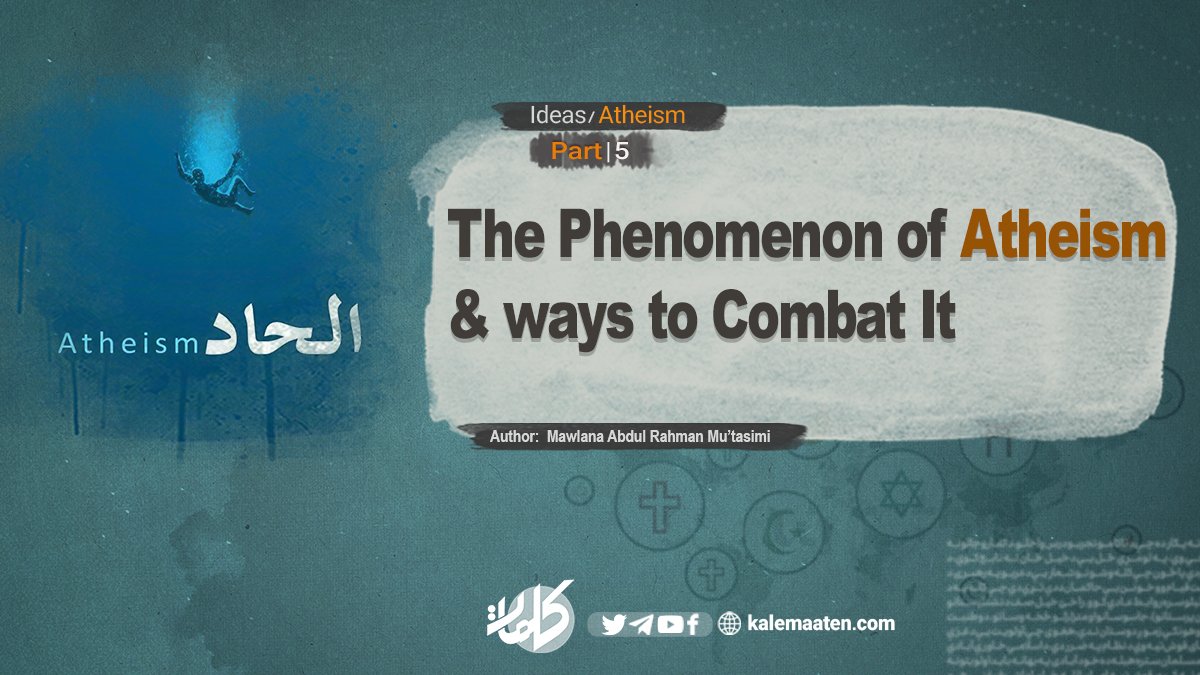
Author: Mawlana Abdul Rahman Mu'tasimi
The Phenomenon of Atheism and Ways to Combat It (Part Five)
Second Topic: The History of Atheism (Past, Present, and Statistics)
Faith in Almighty Allah and religion is an innate aspect of human nature. Human beings are inherently created with a deep awareness of their need for belief in God, a connection with Him, and the practice of worship and servitude. Throughout history, the profound bond between human life and religion has been evident in various forms. As the historian Plutarch observed: “In history, cities without fortresses, palaces, and schools have been found; but cities devoid of places of worship have never been discovered.”
For this reason, the denial of God’s existence and the rejection of religion have historically been considered unusual, rare, and fundamentally unacceptable.
Nevertheless, in the past, there were occasionally a few individuals who emerged, displaying atheism and denial of the existence of God, and they were so few in number that they were referred to as a “small group.” In the following lines, brief information about such people will be presented.
Some Indian philosophies around six centuries before Christ rejected belief in God. Additionally, in ancient Europe, some philosophers such as Socrates, Diagoras, Democritus, Critias, Prodicus, Philodemus, Protagoras, Theodorus, Strato, Oenomaus, Epicurus, and others either did not believe in God or were accused of disbelief in God. In the early Middle Ages through the Renaissance, atheism was rare; instead, religion and theology were the dominant beliefs of this period.
Criticism of Christianity increased in the 17th and 18th centuries. The first openly atheist individual was the German religious critic Matthias Knutzen, who expressed his views in three writings in 1674. Following him, two other writers, the former Jesuit philosopher from Poland, Kżymerż Wiśniewski, and the French priest Jean Meslier, explicitly declared their atheism. Continuing this trend throughout the 18th century, other atheist thinkers publicly emerged, including Baron d’Holbach, Jacques André Naigeon, and other French materialists.
The French Revolution brought atheism and anti-clericalism out of the salons and into the public sphere. Baron d’Holbach was a prominent figure in the French Enlightenment; he is known for his atheism and numerous writings against religion, the most famous of which are “The System of Nature” (1770) and “Christianity Unveiled.”
The Napoleonic era institutionalized the secularization of French society and sought to export the revolution to northern Italy in hopes of establishing a flexible republic. In the 19th century, atheists played a role in political and social revolutions, including the events of 1848 in the unification of Italy and the rise of the global socialist movement.
In the second half of the 19th century, atheism gained significant prominence under the influence of philosophers who supported rationalism and free thought. Many German philosophers during this period denied the existence of gods, including Ludwig Feuerbach, Arthur Schopenhauer, Max Stirner, Karl Marx, and Friedrich Nietzsche.
Atheism in the 20th century, particularly in the form of practical atheism, advanced in many societies. Atheistic ideas appeared across a wide range of philosophies, including existentialism, objectivism, secular humanism, nihilism, anarchism, logical positivism, Marxism, feminism, and general scientific and rationalist movements.
The 20th century also witnessed political advancements in atheism, resulting from the interpretation of the works of Marx and Engels. After the 1917 Russian Revolution, religious education was banned by the Soviet government. Many other communist governments also opposed religion and enforced state atheism, including the governments of Albania and, currently, China, North Korea, and Cuba.
Blackford and Schuklenk write: “The Soviet Union was certainly an atheistic state. This is also true for China during Mao and the Khmer Rouge under Pol Pot; however, this does not indicate that the crimes committed by those dictators were a result of atheistic beliefs, carried out in the name of atheism, or due to the atheistic aspects of communism.” Since the fall of the Berlin Wall, the number of regimes that are actively anti-religious has significantly decreased.
Continues…



